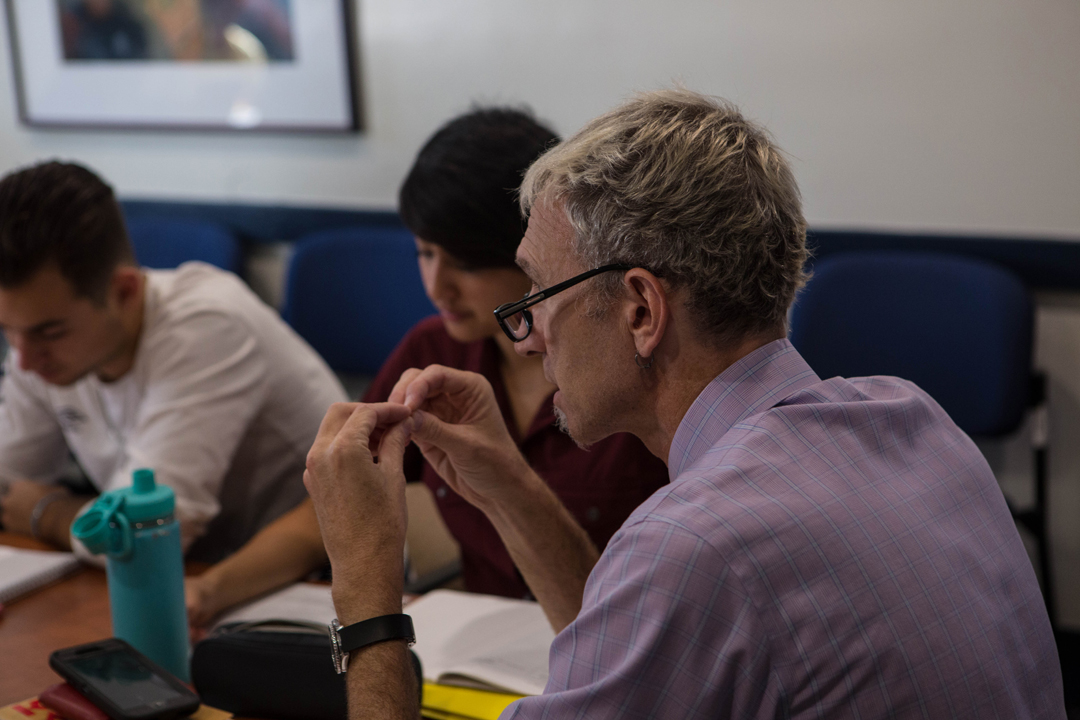Jin Haugland has a love/hate relationship with her cell phone. On the one hand, the first-year student from Houston, Texas, knows her phone is an indispensable tool for connecting with the rest of the world—or even just her friends on Instagram. But it’s also caused her a fair amount of stress. In high school, her screen-time was a source of tension with her parents. And even today, she worries that her phone isn’t just sapping her attention, but also her physical and emotional health. “If I’m not careful, my phone usage can steal hours from my day, leaving me anxious, lonely and miserable,” she said.
That kind of cell phone ambivalence is at the core of Associate Professor of Anthropology and International Affairs Alexander Dent’s Dean’s Seminar on The Anthropology of the Cell Phone. Dent asks his 19 first-year students to examine the ever-present role smartphones play in society while also looking deeply at their own personal attachments to their devices. Without finger wagging or generational judgments, he encourages the class to train an anthropologist’s eye on the way cell phones inhabit their world.
“The class seeks to raise consciousness about this device that has become deeply implicated in our day-to-day affairs,” Dent said. “I want students to see this current moment in an historical context and explore how technology provides both solutions and conveniences. But we also look at the flip side: What are the costs? How do we feel about our phones? How do they make us feel about ourselves?”
Cellular Connections
For the past six years, Dent has made cell phones the focus of his anthropological studies. He is the principal investigator of the Cellular Connections Project, a National Science Foundation-funded research initiative evaluating the effects of cellular technology on D.C. teens. Along with fellow investigators Professor of Anthropology and International Affairs Joel Kuipers and Joshua Bell, an adjunct professor in the Anthropology Department and curator of globalization at the Smithsonian Institution’s National Museum of Natural History, the project’s research will form the basis for a Smithsonian exhibit on cell phones in 2020. Bell is curating the exhibit.
“Cell phones are everywhere,” Dent noted. “They are in the bedroom, the supermarket, the classroom, the church service, the car.” Indeed, according to a 2018 Pew Research Center report, 95 percent of Americans have access to smartphones—a figure that’s consistent across genders, race, ethnicity and socioeconomic background. The report also notes that American adults spend an average of four hours per day on mobile devices, while almost a fifth of young people aged 16 to 24 are online for seven hours a day.
In his research and his teaching, Dent embraces the central position cell phones hold in society. With his students, he discusses the impact mobile devices have had in providing oppressed groups a global forum to counteract violence, from the Arab Spring to Black Lives Matter to #MeToo. But he also wants students to understand the more troubling aspects of cell phone use, like intrusive marketing and privacy issues, as well as the residual anxiety when the phone is not close by. Smartphone separation “is an anxiety that actually manifests itself as physical pain,” Dent said. “You really do lose a piece of yourself—your communicative efficacy.”
In some ways, anxieties about cell phone use mirror past warnings about technical advances like television and landline telephones. What makes cell phones different—portability, instant response times, a unique ability to transcend space—has also ingrained them in our lives. “I enjoy the convenience of having internet access 24/7 and constant connection with my friends and family back home but I definitely know that it’s not all good,” said first-year student Imani Harris. She now limits the number of hours she spends on her phone—her goal is less than three a day—and has reduced both her social media apps and the types of newsfeeds she follows. “I definitely am putting thought into how I use my phone and I’m trying to be more conscious of those habits,” Harris said.
In Dent’s Dean’s Seminar, Harris and her classmates gather cell phone data like anthropologists observing cultural customs and social practices. The assignments include interviewing classmates about their cell phone relationships, keeping a detailed journal on their own phone habits and observing cell phone usage at food courts, sporting events, libraries and other locations.
“This is what anthropology is all about—we take a deep dive into subjects," Dent said. “We’re about depth not breadth.”
For many of Dent’s students, the Dean’s Seminar is their first exposure to anthropology. Harris said she Googled the definition of anthropology before signing up for the class. “I always assumed anthropology was just another branch of history. But it fits perfectly with my personal pursuit of a deeper understanding of my own cultures and those around me,” she said. “Now I’m like ‘Where has this been my whole life?’”


